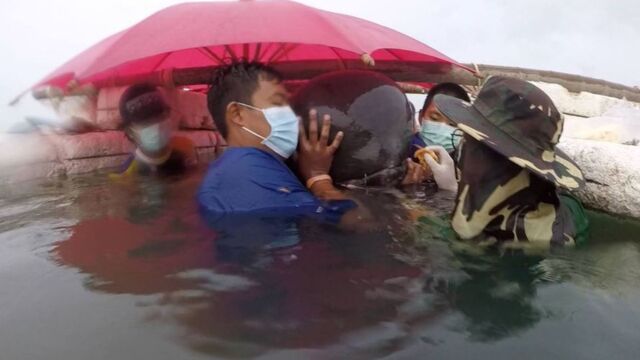It really is an awful truth that affects mammals all around the world. Last February, a sperm whale was found on a beach in the South of Spain, poisoned by around 30kg of plastic that had made its way into its stomach, then in Thailand, a pilot whale also fell victim to the swarms of plastic in the oceans.
Discover our latest podcast
In June last year, rescue workers and vets came together to try and save a pilot whale that was clearly in agony in a canal in Thailand close to the Malaysian border.
Starving, the animal was struggling to breathe and swim. Rescue teams used buoys that they placed around the trembling body to try and keep it afloat as well as parasols that were used to keep the whale cool. But despite five days of effort and uncertainty, the rescue teams were unable to save the animal in which they found no less than 7.7kg of plastic waste.
An autopsy that was as revealing as alarming
An incredible amount of waste was found in the pilot whale’s stomach by vets during an autopsy and scaring images of this were then made public on social media by the Department of Marine and Coastal Resources in Thailand. The five bags spit out by the marine mammal just before it died hardly made a dent on all the waste that was inside the whale.
According to Thai officials, the cause of this poisoning was due to the nutritional habits of the animal. Used to eating squid, octopus or even cuttlefish, it is obvious that the pilot whale confused the plastic bags floating around in the water with these fish.
A colossal and worldwide problem
So it’s a well-known fact that the amount of pollution has increased greatly over the past years. With more than 8 million tons of plastic thrown into the ocean every year according to recent estimations, the entire world’s waters are now full of waste; from the Indonesian island of Bali, as shown in photos recently released by a British diver, to the abyssal depths of the Mariana Trench, 11,000 meters below sea-level.
This is very harmful for marine animals throughout the entire world, as was confirmed by the biologist Thon Thamrongnawasawat, leader of the conference at the Kasetsart University in Bangkok in Thailand. “If you have 80 plastic bags in your stomach, you will die,” said the specialist in an interview with the AFP. “At least 300 marine animals die every year after ingesting plastic in Thai waters,” he added.
If nothing is done, there could end up being more plastic in the oceans than fish by the time we get to 2050. This is a worrying concept that is raising concerns because this could lead to the number of marine animals poisoned by rubbish multiplying in the years to come. An awful truth that probably won’t change anytime soon.
Take a look at the video above for more on this awful discovery.















